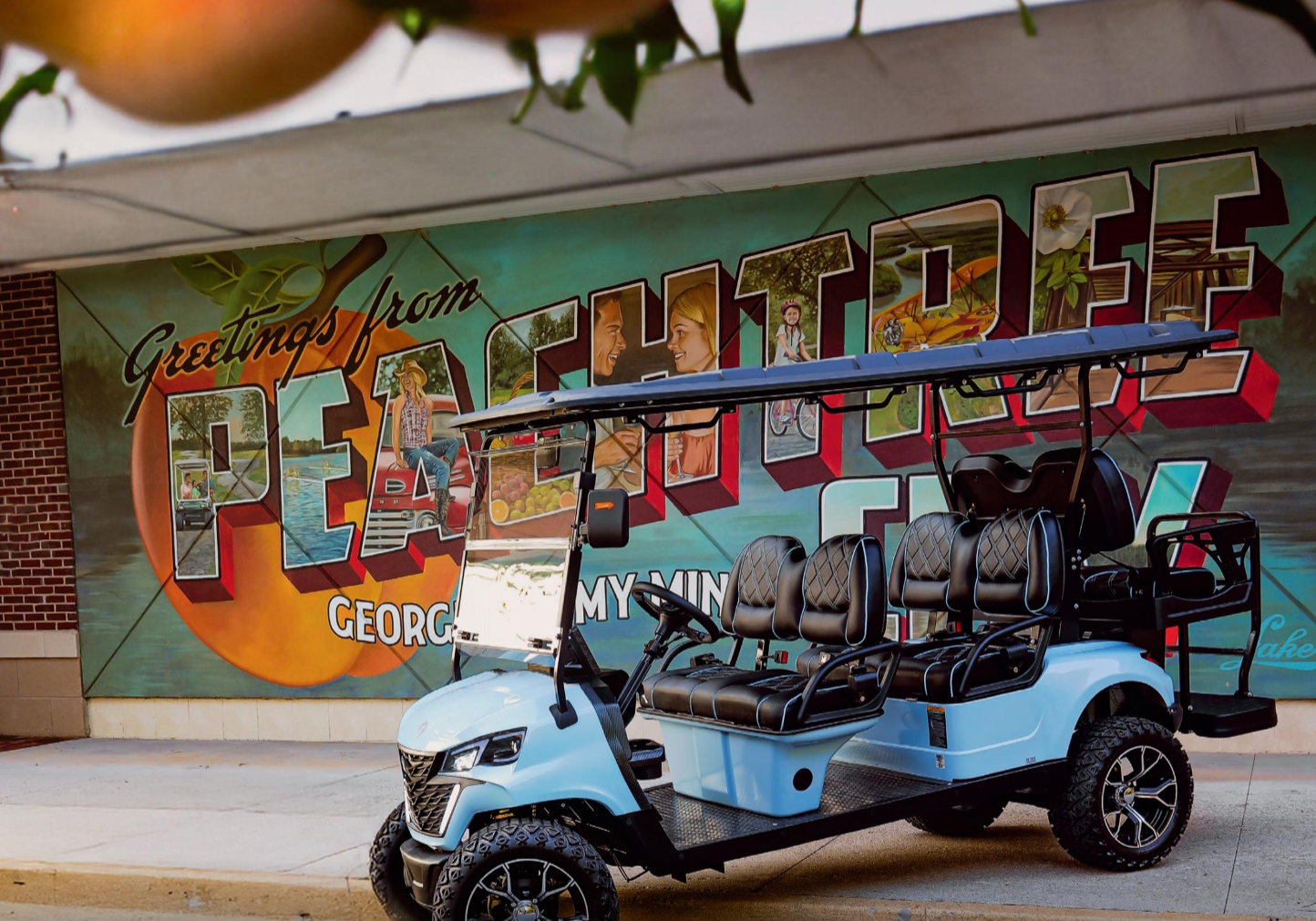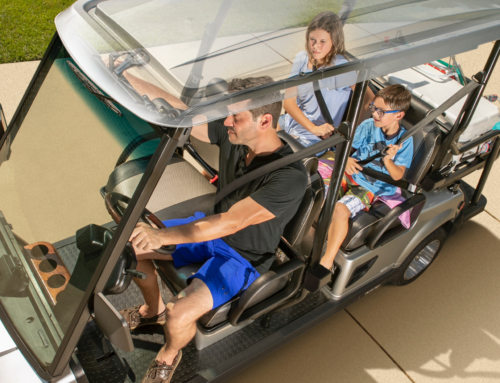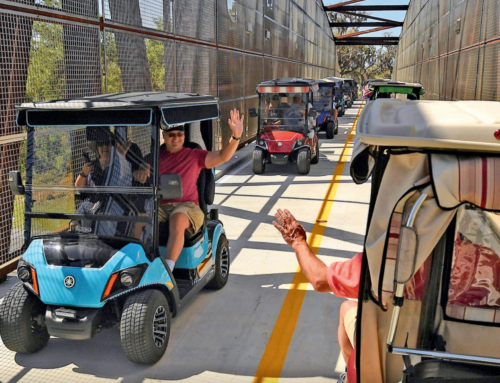Community Spotlight: Peachtree City – Where Life Rolls at 15 MPH
In our ongoing series exploring America’s most golf cart-friendly communities, we visit Peachtree City, Georgia – a pioneering planned community where golf carts aren’t just a convenience but a way of life.
When real estate developers began amassing over 12,000 acres of farmland in Fayette County, Georgia in the 1950s, they envisioned something revolutionary: a master-planned community where residents could navigate their daily lives without always relying on traditional automobiles. What began as a bold concept officially chartered on March 9, 1959, has evolved into one of America’s most distinctive and livable communities.
A Network Like No Other: The Path System by the Numbers
Peachtree City’s hallmark feature is its remarkable multi-use path system:
- Over 100 miles of paved paths
- Connects all five villages that make up the city
- Accessible by golf cart, bicycle, or on foot
- Features bridges, tunnels, and underpasses for crossing major roads
- Population of approximately 38,000 residents
- Consistently ranked among America’s most livable cities

“Peachtree City’s multi-use path system is more than just a transportation network. It’s a part of who we are with over 100 miles of paths off. Our residents can reach schools, parks, shopping and restaurants by golf cart,” stated Peachtree City mayor, Kim Learnard. “It’s a lifestyle that sets us apart. And brings a sense of freedom, fun and connection to everyday life.”
Beyond Basic Transportation
In Peachtree City, golf carts have transcended their origins on the fairway to become the preferred mode of transportation for many residents. The city’s embrace of these vehicles has created a distinct culture all its own.
The golf cart culture developed organically as the path system expanded. Today, it’s a defining characteristic of the community, with many residents customizing their carts to reflect their personalities and interests.
The city’s accommodations for golf carts are comprehensive, with designated parking areas at shopping centers, schools, recreation facilities, and even houses of worship. Many homes feature special golf cart garages or carports, and local businesses have adapted to serve this unique market.
A Community Built for Connection
 While many communities have adapted to accommodate golf carts after development, Peachtree City stands apart as one of the few places where multi-modal transportation was central to the original master plan. The city is organized into five distinct villages—Aberdeen, Braelinn, Glenloch, Kedron, and Wilksmoor—each with its own shopping areas, recreational facilities, and elementary schools, all connected by the path system.
While many communities have adapted to accommodate golf carts after development, Peachtree City stands apart as one of the few places where multi-modal transportation was central to the original master plan. The city is organized into five distinct villages—Aberdeen, Braelinn, Glenloch, Kedron, and Wilksmoor—each with its own shopping areas, recreational facilities, and elementary schools, all connected by the path system.
This thoughtful design creates both privacy and accessibility, allowing residents to enjoy natural settings while still having convenient access to amenities. The path system winds through natural settings of lakes, parks, and playgrounds, creating countless opportunities for chance encounters and spontaneous socializing.
The benefits extend beyond convenience. Residents report significant savings from reducing their reliance on traditional vehicles, with lower fuel costs, reduced maintenance expenses, and the ability to postpone teen driving in favor of golf cart usage for younger family members.
Recreation and Lifestyle
While golf is certainly an attraction with three golf courses within the city limits, Peachtree City’s recreational offerings extend far beyond the fairways. The community boasts numerous parks, sports facilities, and natural areas including:
- The 500-acre Flat Creek Nature Area with boardwalks through wetlands
- Lake Peachtree and Lake Kedron for fishing and non-motorized boating
- The Frederick Brown Jr. Amphitheater (“The Fred”) hosting concerts and events
- Multiple tennis centers, swimming pools, and sports fields
- Nearby connections to Line Creek Nature Area
The city hosts numerous community events throughout the year, including a significant 4th of July celebration, the Shakerag Arts & Crafts Festival, and various cultural festivals.
Creating Community Through Transportation
Perhaps the most remarkable aspect of Peachtree City is how the golf cart culture has shaped social interactions. The open-air, slower pace of golf cart travel encourages residents to wave at neighbors, stop for impromptu conversations, and engage with their surroundings in a way that enclosed, faster-moving vehicles don’t allow.

“There’s something truly special about traveling through town at 15 miles per hour,” noted Learnard, who has been a long-time resident of Peachtree City. “Our paths create moments to wave to neighbors, chat with friends, and enjoy the ride. It’s not just about where you’re going–it’s about the connections you make along the way.”
This sense of connectivity extends to safety as well. The city consistently ranks among the safest in Georgia, with the path system allowing residents of all ages to maintain independence without the risks associated with driving on busy roads.
 As the city continues to grow and evolve, the commitment to golf cart accessibility remains central to planning, with new developments required to connect to the existing path system.
As the city continues to grow and evolve, the commitment to golf cart accessibility remains central to planning, with new developments required to connect to the existing path system.
In Peachtree City, they haven’t just created paths for golf carts—they’ve paved the way for a different approach to suburban living entirely.
FAST FACTS: PEACHTREE CITY
Location: Fayette County, Georgia, approximately 25 miles southwest of Atlanta
Population: Approximately 38,000 residents
Golf Cart Culture: Over 10,000 registered golf carts with extensive path infrastructure
Recreation: 3 golf courses, multiple recreation centers, lakes, nature areas, and the Frederick Brown Jr. Amphitheater
Notable Features: 100+ miles of multi-use paths connecting five village centers
Website: Peachtree-City.org






